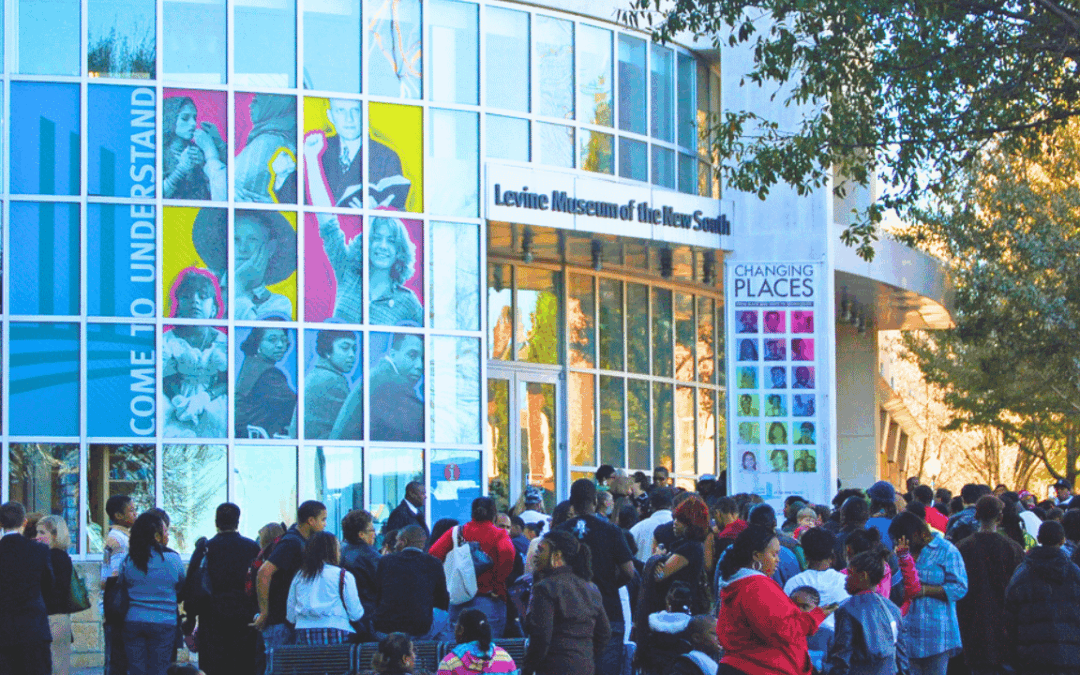Unearthing the Queen City’s Soul: A Comprehensive Guide to Charlotte’s Must-Visit Historical Sites
That unexpected encounter with a historical marker during a casual Uptown stroll – a moment many of us long-time Charlotteans can relate to – serves as a potent reminder: our city’s story is etched not just in towering skyscrapers but also in the quiet corners, the preserved buildings, and the thoughtfully curated exhibits that whisper tales of generations past. Beyond the gleaming facade of modern Charlotte lies a rich and complex history, a tapestry woven with threads of innovation, resilience, struggle, and progress.
This isn’t just a list; it’s an invitation. An invitation to delve deeper into the narrative of the Queen City, to move beyond the familiar and truly connect with the land and the people who shaped it. Whether you’re a recent transplant eager to understand your new home or a lifelong resident seeking a fresh perspective, these historical sites offer invaluable insights into the very essence of Charlotte. So, lace up your walking shoes, prepare to have your assumptions challenged, and embark on a journey through time right here in our own backyard.
1. Levine Museum of the New South: Understanding the Transformation
More than just dusty artifacts, the Levine Museum of the New South stands as a dynamic and vital institution dedicated to unraveling the profound transformations that have swept across the South, with a particular focus on Charlotte, since the close of the Civil War. This isn’t a romanticized portrayal of history; instead, the museum fearlessly confronts the complexities of the past, including the stark realities of segregation, the fervent struggles for civil rights, and the sweeping economic and social shifts that have molded the region into what it is today.
Through compelling interactive exhibits, poignant personal narratives, and meticulously researched displays, the Levine Museum encourages visitors to actively engage with history. You’ll find yourself immersed in the stories of ordinary people who lived through extraordinary times, gaining a deeper understanding of the challenges they faced and the triumphs they achieved. This museum serves as a crucial bridge, connecting the historical context with the present-day realities of our city, fostering a more nuanced and informed understanding of the forces that continue to shape Charlotte.
📍 Location: 200 E 7th St, Charlotte, NC
⭐ Ideal for: Locals seeking a profound understanding of Charlotte’s journey from its post-Civil War era to the dynamic metropolis it is today. It’s particularly impactful for those interested in social justice, urban development, and the diverse experiences of the city’s inhabitants. Allow ample time to fully absorb the powerful storytelling within these walls.
2. Historic Rosedale: A Glimpse into Antebellum Life
Step through the gates of Historic Rosedale, and you’ll be transported to a different era. Built in 1815 in the elegant Federal architectural style, this meticulously preserved home offers a rare and invaluable glimpse into life in Charlotte during the antebellum period. Situated on a tranquil expanse of land, a welcome respite from the urban energy of Uptown, Rosedale allows visitors to wander through the historic house and its serene gardens, imagining the lives of those who once resided within its walls.
However, the narrative of Rosedale extends beyond the prominent family who owned it. Crucially, ongoing efforts are dedicated to acknowledging and reclaiming the stories of the enslaved individuals who lived and labored on this property. Tours delve into their experiences, offering a more complete and honest understanding of the complex social structures of the time. Exploring Rosedale provides a powerful opportunity for reflection on the legacies of the past and the importance of remembering all voices.
📍 Location: 3427 N Tryon St, Charlotte, NC
⭐ Perfect for: History enthusiasts, architecture aficionados who appreciate the Federal style, and anyone seeking a peaceful and contemplative experience. The gardens offer a delightful escape, and the evolving interpretation of the site provides a richer, more inclusive historical perspective. Consider attending one of their special events or workshops for an even deeper engagement.
3. Charlotte Museum of History: Uncovering Local Lore
Often considered a hidden gem within the city, the Charlotte Museum of History offers a multifaceted exploration of the region’s past, from its earliest settlements to its modern-day evolution. Its most notable feature is the Hezekiah Alexander Rock House, the oldest surviving house in Mecklenburg County, offering a tangible link to colonial life. Imagine the stories held within those sturdy stone walls!
Beyond the Rock House, the museum boasts a diverse array of rotating exhibits that delve into various aspects of Charlotte’s history, from its agricultural roots and early industries to the waves of immigration and the development of its unique cultural identity. The museum grounds themselves are a treat, providing a beautiful space for leisurely walks and outdoor exploration. With engaging programs and a commitment to uncovering lesser-known stories, the Charlotte Museum of History is a place where curious minds of all ages can discover fascinating “did you know?” moments.
📍 Location: 3500 Shamrock Dr, Charlotte, NC
⭐ Best suited for: Families looking for an educational and engaging outing, individuals with a thirst for local knowledge, and those who appreciate a blend of indoor and outdoor exploration. Keep an eye on their website for information on upcoming exhibitions and special events that can further enrich your visit.
4. Historic Fourth Ward: Stepping Back in Time in the City’s Heart
A stroll through the Historic Fourth Ward feels like stepping onto a movie set. This captivating neighborhood, nestled within the bustling confines of Uptown, is a stunning showcase of Victorian-era architecture. Imagine vibrant, multi-hued houses with intricate detailing, charming brick sidewalks winding beneath a canopy of mature trees, and a palpable sense of stepping back into a more genteel time – all while the modern city hums just beyond its borders.
More than just a pretty place, Historic Fourth Ward offers a tangible connection to Charlotte’s urban development in the late 19th and early 20th centuries. It’s a testament to preservation efforts and a living example of how the past can seamlessly coexist with the present. Take your time wandering the streets, admire the architectural nuances, pause for a coffee at a local café, and simply soak in the unique atmosphere where old-world charm meets contemporary city life.
📍 Location: Roughly bounded by Graham, Tryon, 7th, and 11th Streets
⭐ Ideal for: Those who appreciate architectural beauty, enjoy leisurely walks and urban exploration, and anyone seeking a picturesque escape within the city. It’s a perfect spot for a relaxed afternoon, offering countless photo opportunities and a chance to appreciate the layers of Charlotte’s urban fabric.
5. Latta Place (Reimagined): A Future of Inclusive History
While currently undergoing a significant transformation, Latta Place (formerly known as Latta Plantation) holds immense potential as a future center for a more inclusive and community-driven exploration of local history. Recognizing the need for a more comprehensive and honest portrayal of the site’s past, including the experiences of the enslaved people who lived and worked there, Latta Place is being reimagined with a focus on amplifying all the voices that have shaped the region.
Although not fully reopened yet, this site is definitely one to keep on your radar. When it re-emerges, it is anticipated to offer fresh perspectives on local history through innovative programming, community engagement initiatives, and a commitment to telling a more complete and nuanced story. Stay informed about its progress and be prepared to experience a revitalized space dedicated to fostering a deeper understanding of our shared past.
📍 Location: 5225 Sample Rd, Huntersville, NC
⭐ Best for: Those interested in the evolving landscape of historical interpretation and community-centered approaches to history. Keep an eye out for announcements regarding its reopening and future events, as it promises to be a significant addition to Charlotte’s historical landscape.

6. First Presbyterian Church: A Beacon of History and Community
Standing proudly in the heart of Fourth Ward, the First Presbyterian Church is more than just a beautiful architectural landmark; it’s a testament to the enduring spirit of community and a witness to significant moments in Charlotte’s history. Founded in 1859, the current Romanesque Revival-style building, with its striking steeple and intricate stained glass windows, has been a fixture of the neighborhood since 1893.
Beyond its aesthetic appeal, First Presbyterian has played a vital role in the social and spiritual fabric of Charlotte. It has weathered numerous historical events, served as a gathering place for generations, and actively participated in community initiatives. Exploring its architecture and learning about its long-standing presence offers a deeper understanding of the city’s evolving social landscape and the enduring importance of faith and fellowship.
📍 Location: 200 W Trade St, Charlotte, NC
⭐ Ideal for: Architecture enthusiasts who appreciate Romanesque Revival design, those interested in the historical role of religious institutions in urban development, and anyone seeking a moment of quiet reflection amidst the city bustle. Consider attending a service or a historical tour if available to fully appreciate its significance.
7. Hezekiah Alexander House (within the Charlotte Museum of History): A Colonial Cornerstone
While mentioned as part of the Charlotte Museum of History, the Hezekiah Alexander House deserves its own dedicated spotlight as the oldest surviving house in Mecklenburg County, dating back to 1774. This sturdy stone dwelling offers an unparalleled glimpse into the lives of early settlers in the region during the tumultuous years leading up to and following the American Revolution.
Walking through its preserved rooms, you can almost hear the echoes of colonial life – the daily routines, the challenges of frontier living, and the conversations that shaped the future of the area. The house serves as a tangible link to a pivotal period in American history and provides a crucial understanding of the foundations upon which Charlotte was built. Exploring the Rock House offers a powerful connection to the individuals who first carved a life out of this land.
📍 Location: 3500 Shamrock Dr, Charlotte, NC (within the Charlotte Museum of History grounds)
⭐ Perfect for: Anyone fascinated by colonial American history, those interested in early architectural styles, and anyone wanting a direct connection to the lives of Charlotte’s earliest European settlers. Allow ample time to explore the house and imagine the world it once inhabited.
8. Elmwood/Pinewood Cemetery: Stories Etched in Stone
More than just a final resting place, the Elmwood/Pinewood Cemetery offers a poignant and fascinating journey through Charlotte’s past. Established in the mid-19th century, this historic cemetery is the final resting place of many of the city’s prominent figures, as well as everyday citizens who contributed to its growth and development.
Wandering through its tree-lined paths and reading the inscriptions on the aged headstones reveals a wealth of information about Charlotte’s social history, family lineages, and even prevailing artistic styles in funerary art. You’ll encounter the names of influential leaders, business pioneers, and individuals whose stories, though perhaps less well-known, collectively paint a rich picture of the city’s evolution. It’s a place for quiet contemplation and a unique way to connect with the generations that came before us.
📍 Location: 700 W 6th St, Charlotte, NC
⭐ Ideal for: Genealogy enthusiasts, those interested in social history and local biographies, and anyone seeking a peaceful and reflective experience. Consider taking a guided tour if available to learn more about the notable individuals interred here and the symbolism within the cemetery’s landscape.
9. Historic Brattonsville (York County, SC): A Plantation with Complex Layers
Just a short drive south of Charlotte lies Historic Brattonsville, a sprawling 775-acre living history farm and Revolutionary War site in York County, South Carolina. While technically outside of Charlotte, its close proximity and significant historical connections to the region make it a must-visit for anyone interested in the broader historical context of the area.
Brattonsville offers a compelling and often challenging look at plantation life from the late 18th to the mid-19th centuries. It encompasses numerous historic buildings, including the homes of the Bratton family and the quarters of enslaved African Americans. The site actively interprets the lives of all who lived and labored here, providing a more complete and nuanced understanding of this complex period in Southern history. Furthermore, Brattonsville was the site of key Revolutionary War skirmishes, adding another layer of historical significance.
📍 Location: 1444 Brattonsville Rd, McConnells, SC
⭐ Perfect for: Those interested in plantation history, the lives of enslaved people, the American Revolution in the Southern colonies, and anyone seeking a comprehensive living history experience. Allow several hours to explore the extensive grounds and participate in any ongoing demonstrations or tours.
10. Mecklenburg County Courthouse (Historic): A Symbol of Justice and Civic Life
While the modern Mecklenburg County Courthouse serves its contemporary purpose, the historic Mecklenburg County Courthouse, located in Uptown, stands as a significant architectural and symbolic landmark. Built in the early 20th century in the Beaux-Arts style, this impressive building housed the county’s judicial and administrative functions for decades.
Its grand facade, with its classical columns and intricate detailing, reflects the civic pride and aspirations of the era in which it was constructed. Although no longer serving its original purpose, the historic courthouse remains a powerful reminder of the evolution of Charlotte’s civic infrastructure and the enduring importance of the rule of law in the community. Its presence contributes to the rich tapestry of Uptown’s architectural heritage.
📍 Location: 800 E 4th St, Charlotte, NC
⭐ Ideal for: Architecture buffs who appreciate Beaux-Arts design, those interested in the history of local government and civic institutions, and anyone exploring the architectural landscape of Uptown. While interior access may be limited, its exterior grandeur and historical significance make it a worthwhile stop.
Why Engaging with Local History Enriches Our Lives
Exploring Charlotte’s historical sites isn’t just an exercise in learning dates and names; it’s an opportunity to cultivate a deeper connection to the place we call home. By understanding the journeys, struggles, and triumphs of those who came before us, we gain a richer appreciation for the present and a more informed perspective on the future. Engaging with local history can:
- Deepen Your Sense of Place: Everyday commutes and neighborhood strolls take on new meaning when you understand the historical layers beneath the surface. That unassuming building might have once been a bustling marketplace, or that quiet street could have been the site of a significant event.
- Foster Meaningful Connections: Sharing these historical discoveries with friends and neighbors can spark engaging conversations and create a stronger sense of community. It’s a shared narrative that binds us together.
- Cultivate Empathy and Understanding: By learning about the diverse experiences of past residents, including those whose stories have been marginalized, we develop a greater capacity for empathy and a more nuanced understanding of the complexities of our society.
- Inspire Civic Engagement: Understanding the historical context of local issues can empower us to become more informed and engaged citizens, contributing to a more just and equitable future.
- Enrich Your Personal Narrative: Recognizing that we are all part of an ongoing story connects us to a larger human experience and provides a deeper sense of belonging.
Final Thoughts: Our Shared Heritage Awaits
The historical sites scattered throughout Charlotte are more than just relics of the past; they are vital threads in the intricate fabric of our city’s identity. They offer tangible links to the people and events that have shaped our present. By taking the time to explore these treasures, whether you’re a newcomer or a lifelong resident, you’re not just visiting a place; you’re engaging with our collective memory, rediscovering the stories that make Charlotte the unique and dynamic city we know and love.
Have you recently explored any of these historical gems? Perhaps you have a favorite lesser-known historical spot in Charlotte that deserves recognition? Share your experiences and recommendations in the comments below or tag @BizKudos on social media when you visit – let’s continue this journey of discovery together!










